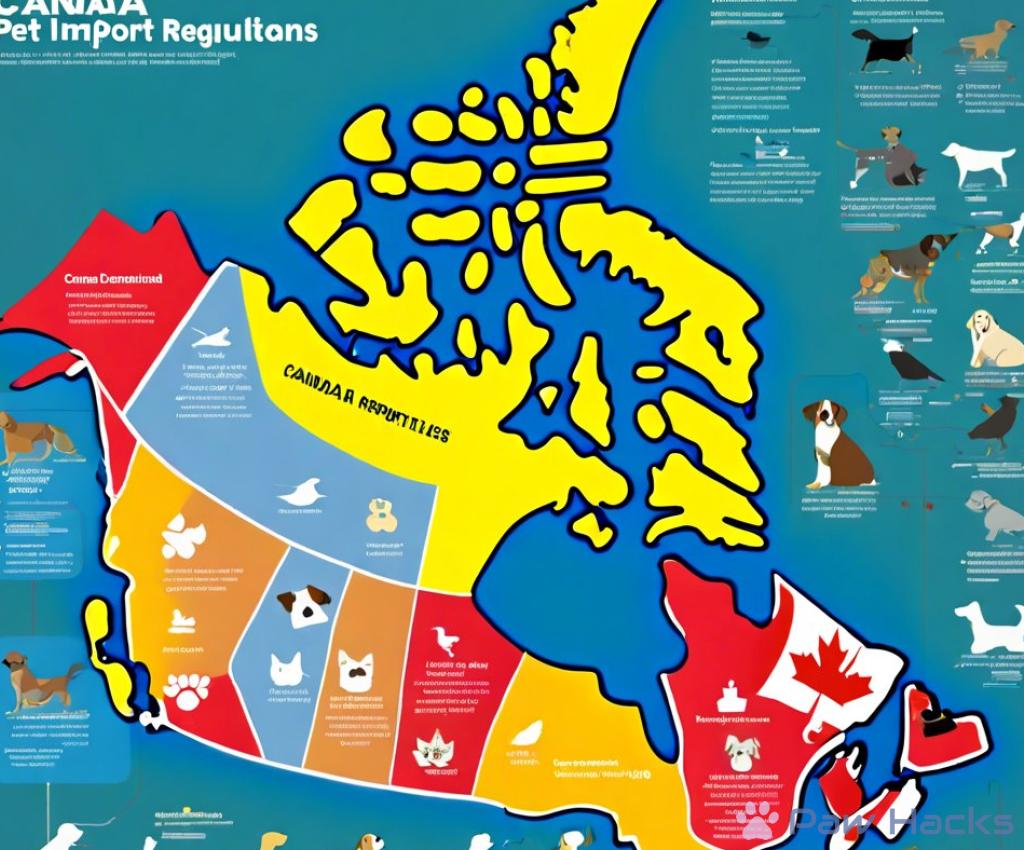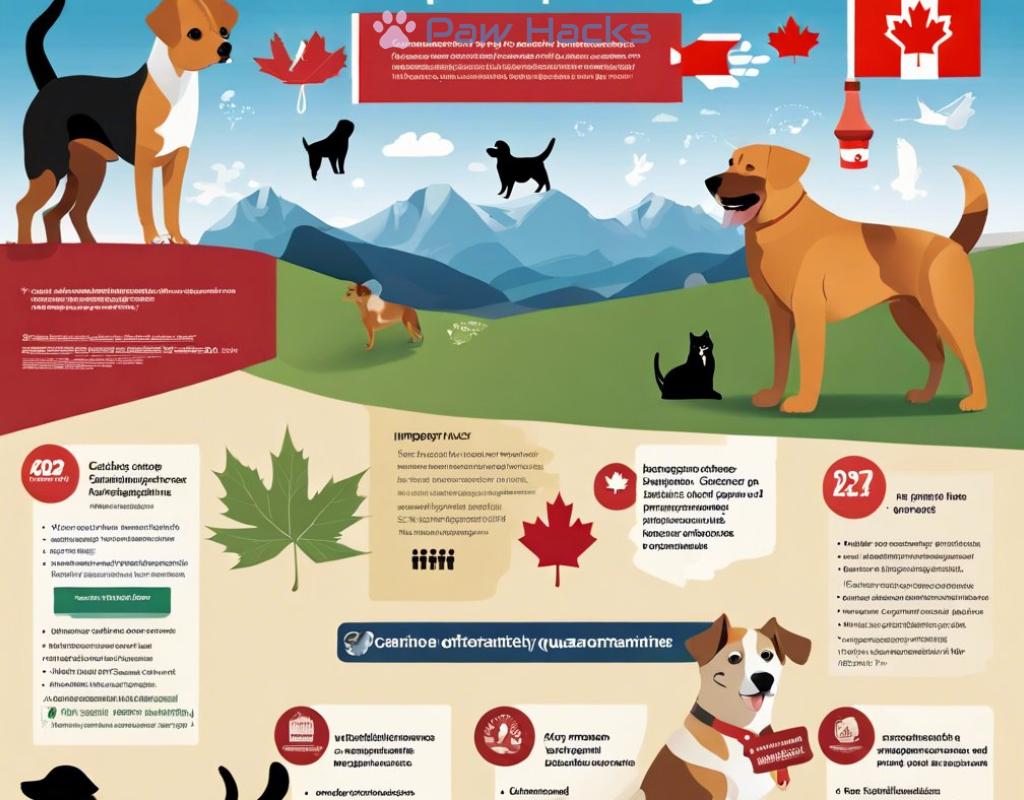Pet Import Laws for Canada
Understanding Canada’s Pet Import Regulations: A Simple Guide

Before setting off on your journey to Canada with your furry friend, it’s crucial to understand the necessary steps to ensure a smooth transition. Canada has specific regulations that pet owners must follow to avoid any complications at the border. Here’s what you need to know.
- Microchipping: Ensure your pet is microchipped and the information is up-to-date.
- Vaccinations: Your pet must be vaccinated against rabies if they are over 3 months old.
- Health Certificate: Obtain a health certificate from a licensed veterinarian within 30 days of your travel date.
Once you’ve prepared your pet for the journey, it’s essential to understand the import process at the Canadian border. Knowing what to expect can ease your anxiety and ensure your pet’s smooth entry into the country.
| Step | Description |
|---|---|
| 1. Arrival | Upon arrival, head to the designated area for pet inspections. |
| 2. Documentation Check | Present all necessary documents, including vaccination records and health certificates. |
| 3. Inspection | Border officials may inspect your pet to ensure they are healthy and conform to regulations. |
After successfully importing your pet into Canada, there are a few additional considerations to keep in mind. Proper care and registration can help ensure your pet’s health and safety in their new environment.
- Registration: Consider registering your pet with a local veterinary clinic.
- Local Laws: Familiarize yourself with local pet ownership laws and regulations.
- Ongoing Health Care: Schedule regular vet check-ups to maintain your pet’s health.
Essential Health Requirements for Bringing Your Pet to Canada
Bringing your pet to Canada is an exciting adventure, but it comes with its own set of health requirements that must be met to ensure a smooth entry. Understanding these essential health regulations is crucial for pet owners who want to avoid any issues at the border. It’s important to prepare well in advance, as these regulations are designed to protect both your pet and the local ecosystem.
Vaccination Requirements
One of the primary health requirements for importing pets into Canada is ensuring that they are up-to-date on their vaccinations. The most critical vaccine is for rabies, which is mandatory for all dogs, cats, and ferrets over three months old. Documentation proving that the vaccine was administered is essential; this should include the date of vaccination, the product used, and a statement from a licensed veterinarian.
Health Certificates and Other Documentation
In addition to vaccinations, a health certificate is a vital document that needs to be obtained from a licensed veterinarian. This certificate should confirm that your pet is in good health and free from any contagious diseases. It is recommended to get this certificate within 30 days of your travel date to ensure its validity. Furthermore, consider carrying records of your pet’s medical history, as this may be beneficial for local veterinary care in Canada.
Lastly, it’s important to note that different provinces in Canada may have unique regulations regarding pet imports. Therefore, staying informed about the specific requirements of your destination can save you time and hassle upon arrival.
Navigating Quarantine Procedures for Pets Entering Canada
When planning to bring your beloved pet into Canada, understanding the potential quarantine procedures is essential. These regulations are in place to protect both the health of your pet and the integrity of Canada’s ecosystem. While not every pet will face quarantine, knowing when and why it might be required can help ease your travel experience.
Quarantine Necessities and Duration are vital aspects to consider. If your pet does not meet the vaccination or health certificate requirements, they may be subject to quarantine. This period can last anywhere from a few days to several weeks, depending on the circumstances. It’s critical to have all documents in order prior to arrival to avoid unnecessary delays.
For most pets that comply with the health regulations, quarantine may not be required. However, if your pet shows signs of illness or if you are coming from a country considered high-risk for certain diseases, border officials may enforce a quarantine. To ensure a seamless entry, ensure that your pet is healthy and all vaccinations are up-to-date, particularly the rabies vaccine.
Understanding the Quarantine Process if required, can also alleviate concerns. During quarantine, your pet will be housed in a facility that meets strict health standards. Veterinary staff will monitor their health and ensure they are free from parasites and diseases. You may also be allowed to visit your pet during this time, depending on the facility’s policies.
In case your pet does need to be quarantined, having a plan in place can be beneficial. Research local quarantine facilities ahead of time to know where your pet will be staying and ensure they are treated with care. Keeping in touch with the facility can also provide peace of mind during this process.
Conclusion: Being informed about the potential quarantine procedures your pet may face when entering Canada is crucial for a smooth transition. By ensuring compliance with vaccination and health requirements, you can significantly reduce the chances of quarantine. Always strive to stay updated with the latest regulations, as these can change based on emerging health concerns.
Choosing the Right Documentation for Pet Importation
When preparing for a journey to Canada with your pet, the importance of having the correct documentation cannot be overstated. Proper documentation serves as a safeguard to ensure that your pet meets all health and safety regulations set by Canadian authorities. In this section, we will explore the essential documents required for a successful pet importation process, along with tips to streamline your experience.
Essential Documents for Pet Importation
The cornerstone of a smooth import experience lies in securing the necessary documents. The health certificate is paramount, as it confirms your pet’s health status and must be issued by a licensed veterinarian. This certificate should be obtained within 30 days of your travel date, ensuring its validity upon arrival in Canada. Additionally, documentation of your pet’s vaccination records, particularly the rabies vaccine for pets over three months of age, is crucial. This record should include specific details such as the date of vaccination and the product used.
Staying Informed About Local Regulations
While the general requirements for pet importation are standardized, it’s essential to recognize that specific provinces in Canada may have unique regulations. Therefore, it is advisable to research local laws regarding pet ownership in your destination province. This proactive approach not only helps you avoid unnecessary complications but also ensures you have all the required documentation tailored to your new home. In some cases, additional permits or documentation may be needed based on the province’s regulations regarding specific breeds or species.
Lastly, consider maintaining a comprehensive medical history record for your pet. This document can be invaluable if you need to seek veterinary care upon arrival. Having all of this information organized and ready will not only facilitate a smooth border crossing but also provide peace of mind as you embark on this new adventure with your furry companion.
Common Mistakes to Avoid When Importing Pets to Canada
Overlooking Health Requirements
One of the most significant mistakes pet owners make is neglecting the health requirements set forth by Canadian authorities. Many assume that as long as their pet is healthy, they can bypass the necessary vaccinations and health certificates. This misconception can lead to severe complications at the border. Always ensure that your pet is up-to-date on their vaccinations, particularly the rabies vaccine, which is mandatory for all pets over three months old. Additionally, remember to secure a health certificate from a licensed veterinarian within the required timeframe before your travel date. This document acts as proof that your pet is healthy and free from contagious diseases, making it crucial for a hassle-free importation process.
Inadequate Research on Local Regulations
Another common pitfall is failing to research local regulations specific to the province you are entering. Each province in Canada may have its own set of rules and requirements regarding pet ownership and importation. For instance, some regions might have restrictions on certain breeds or additional permits needed. By neglecting to familiarize yourself with these local laws, you risk encountering unexpected delays or fines. Thus, conducting thorough research beforehand will not only ease your transition but also ensure that you have all the necessary documentation tailored to your new environment.
Ignoring Quarantine Procedures
Many pet owners mistakenly believe that their pets will not face quarantine upon arrival in Canada, leading to unnecessary stress during the travel process. It’s essential to understand that if your pet does not meet the health regulations, they may be subject to quarantine procedures. This could happen if your pet shows signs of illness or if you are arriving from a high-risk country. To avoid this, keep all vaccination records up-to-date and ensure your pet is healthy before travel. By doing so, you can significantly reduce the chances of quarantine and ensure a smoother entry for your beloved companion.
Share this content:



